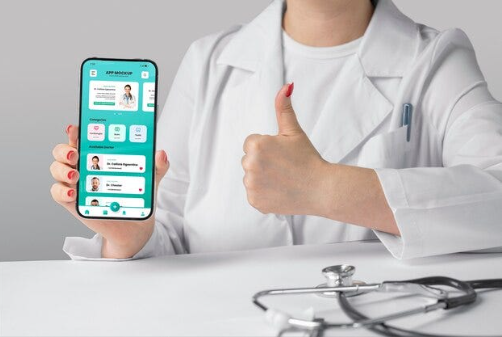Navigating Trends in Healthcare Mobile App Development

Mobile apps have become catalysts for transformative change across various industries, and healthcare is no exception. The convergence of technology and wellness has given rise to a plethora of healthcare apps designed to enhance patient care, facilitate remote monitoring, and promote overall well-being. Let’s delve into the dynamic landscape of healthcare mobile app development, exploring current trends that are shaping the future of digital health.
1. Telehealth Revolution: Beyond Clinic Walls
The seismic shift towards telehealth has propelled healthcare apps into the spotlight. Telehealth apps facilitate remote consultations, enabling patients to connect with healthcare providers from the comfort of their homes. As the trend continues to gain momentum, expect further innovations in virtual care, including real-time diagnostics and treatment monitoring.
2. Wearable Technology Integration
The synergy between healthcare apps and wearable technology is transforming the way individuals engage with their health. Integrating wearables allows for continuous health monitoring, from tracking daily steps to monitoring vital signs. This trend emphasizes the importance of preventive healthcare, providing users with actionable insights for a proactive approach to well-being.
3. Personalized Medicine through AI
Artificial Intelligence (AI) is ushering in a new era of personalized medicine. Healthcare apps leverage AI algorithms to analyze vast datasets, enabling the customization of treatment plans based on an individual’s unique health profile. Expect AI-driven apps to become increasingly sophisticated in predicting disease risks and tailoring interventions for optimal outcomes.
4. Mental Health and Mindfulness Apps
The recognition of mental health as an integral component of overall well-being has led to the proliferation of mental health and mindfulness apps. These apps offer meditation sessions, stress management tools, and mood tracking features. The trend reflects a growing awareness of the importance of mental health in the broader healthcare landscape.
5. Blockchain for Data Security
As the volume of health data exchanged through apps continues to rise, so does the importance of robust security measures. Blockchain technology is emerging as a solution to enhance the security and integrity of health data. Blockchain’s decentralized and tamper-resistant nature provides a secure foundation for storing and sharing sensitive patient information.
6. Chronic Disease Management Apps
The focus on preventive care extends to the management of chronic diseases. Healthcare apps dedicated to chronic disease management empower patients to monitor their conditions, adhere to treatment plans, and communicate with healthcare providers. This trend fosters a shift towards patient-centric care and improved outcomes for individuals with chronic health conditions.
7. Augmented Reality (AR) for Healthcare Education
Augmented Reality (AR) is finding its way into healthcare mobile app development, particularly in the realm of education. Medical training apps use AR to provide immersive learning experiences for students and healthcare professionals. Patients can also benefit from AR apps that offer visualizations of medical procedures, enhancing their understanding of treatment processes.
8. Remote Patient Monitoring Apps
The ability to monitor patients remotely is revolutionizing healthcare delivery. Remote patient monitoring apps enable healthcare providers to track vital signs, medication adherence, and disease progression in real-time. This trend not only enhances patient care but also reduces the burden on healthcare systems.
9. Social Determinants of Health Integration
Healthcare apps are increasingly recognizing the impact of social determinants on health outcomes. Integrating social determinants of health data into apps allows for a more comprehensive understanding of an individual’s well-being, enabling targeted interventions that address both medical and social needs.
10. Gamification of Health and Wellness
Gamification techniques are being employed to make health and wellness engaging. Apps use game-like elements to encourage users to adopt healthier lifestyles, adhere to medication schedules, and achieve fitness goals. This trend leverages the innate human desire for competition and rewards to drive positive health behavior changes.
11. Integration of Emerging Technologies
Looking forward, the integration of emerging technologies like 5G and the Internet of Things (IoT) is set to redefine the capabilities of healthcare apps. Faster connectivity, real-time data exchange, and enhanced device interoperability will pave the way for new innovations, enabling more sophisticated healthcare solutions.
12. Data Analytics and Predictive Modeling
The future of healthcare app development will witness a deeper integration of data analytics and predictive modeling. Apps will utilize advanced analytics to derive meaningful insights from large datasets, offering personalized health recommendations and predicting health risks with greater accuracy.
13. User-Centric Design and Accessibility
As healthcare apps continue to evolve, a paramount focus will be on user-centric design and accessibility. Ensuring that apps are intuitive, inclusive, and user-friendly will be crucial in maximizing their impact. This entails considering diverse user needs, including those with varying abilities and linguistic backgrounds.
14. Global Health Initiatives
Healthcare apps are increasingly becoming part of global health initiatives, contributing to improved healthcare accessibility worldwide. Initiatives addressing infectious diseases, vaccination campaigns, and maternal health are leveraging apps to disseminate information, provide remote consultations, and track health metrics on a global scale.
Conclusion
The landscape of healthcare mobile app development continues to evolve, driven by technological advancements and a deepening understanding of holistic health. The trends outlined above represent a snapshot of the current state of healthcare apps, but the journey is far from over. The future promises even more innovations, from the integration of emerging technologies like 5G and Internet of Things (IoT) to novel approaches in data analytics and predictive modeling.




